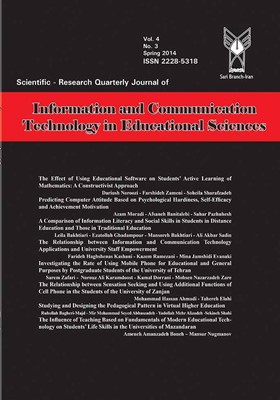A Comparison of Information Literacy and Social Skills in Students in Distance Education and Those in Traditional Education
Subject Areas :
Infomartion Technology
Leila Bakhtiari Bakhtiari
1
*
,
Ezatollah Ghadampour Ghadampour
2
,
Mansoreh Bakhtiari Bakhtiari
3
,
Ali Akbar Sadin Sadin
4
1 - MA in Educational Technology, Payam Noor University, Iran
2 - Assistant Professor of Educational Psychology, University of Lorestan, Iran
3 - MA in Educational Technology, University of Lorestan, Iran
4 - PhD Student in Educational Administration, Kharazmi University, Iran
Received: 2013-10-25
Accepted : 2013-11-01
Published : 2014-05-01
Keywords:
e-learning,
Distance education,
Information literacy,
social skills,
Abstract :
The present study aimed to compare the amount of information literacy and social skills of high school students trained in traditional education and distance one. Considering the aim, it is a practical study, and considering data collection, it is a descriptive cross sectional survey study. The population of the study was all5400 female and male high school students in Arak city. The sample size was 240people selected through a combination of stratified and cluster sampling methods. Data collection tools were standardized social skills questionnaire and researcher-made information literacy questionnaire. The reliability co-efficiencies of the questionnaires were 0.91 for information literacy and 0.73 for social skills. The data was analyzed using descriptive statistics (mean, percentage, frequency, standard deviation) and inferential statistics (two independent groups t test). The results showed that there was no significant difference between information literacy of students in traditional education and in distance education system. Also there was no significant difference between social skills in the two groups.
References:
Atreja, A., Mehta, N. B., Jain, A. K., Harris, C. M., Ishwaran, H., Avital, M., et al. (2008). Satisfaction with web-based training in an integrated healthcare delivery network: Do age education, computer skills and attitudes matter?. BMC Med Edu, 35, 60-63.
Bairam, M. (2006). Effects of social skills and social competence and projected changes in components of social competence in academic success. Ph.D. Thesis. Tarbiat Moallem University of Tehran. )in Persian).
Bakhtiarzadeh, A. (2002). Assessment information literacy of Al Zahra Students' in their final year of undergraduate. Master's Thesis, Tehran University of Medical Management and Informatics. )in Persian).
Bardestany, M. (2004). Meta cognition approach to information literacy. Congress on User Education and Information Literacy in Libraries and Information Centers, Mashhad, 1 and 2 June. Mashhad: The organization of libraries, museums and the documentation center of Astan- Quds –Razavi. (in Persian).
Engelbrecht, E. (2005). Adapting to changing expectations: Post graduate students experience of an e- learning tax porgram. Computers & Education, 45(2), 217-229.
Gholami, S. (2008). The relationship between information literacy and critical thinking of students in Arak University (Faculty of Humanities). Master's Thesis. Arak University. )in Persian).
Govindasamy, T. (2002). Successful implementation of e-learning pedagogical considerations. The Internet and Higher Education, 4, 287-299.
Hargie, A., Saunders, K., & Dixon, D. (1995). Social skills in interpersonal communication (Translated by Khashayar Beigi and Firozbakht). Tehran: Growth.
Imamoglu, S. Z. (2007). An empirical analysis concerning the user acceptance of e-learning. Journal of American Academy of Business, 11, 132-137.
Jennings, A., Mullally, A., Oconnor, C., & Dolan, D. (2006). Is the jury still out for“blended learning” ? Use of a web- based collaborative teaching platform. In J. Fillipe, J. Cordeiro, & V. Pedrosa (Eds). (2001). Web Information Systems and Technologies (PP. 355-366). Heidelberg, Germany: Springer.
Keramati, M. R. (2003). The impact of cooperative learning on social skills development and learning of mathematics. Ph.D. Thesis, Tarbiat Moallem University, Tehran. )in Persian).
Khan, B. H. (2000). A Framework for web-based learning. Englewood Cliffs, NJ: Educational Technology Publications.
Lee, B. Ch., Yoon, J., & Lee, I. (2009). Learners acceptance of e- learning in South Korea: Theories and results. Computers & Education, 53, 1320-1329.
Lee, Y. H., Hsieh, Y. Ch., & Ma, Ch. Y. (2010). A model of organizational employees e-learning systems acceptance. Knowledge- Based Systems, 24(12), 768-785.
Liaw, Shu-Sh. (2008). Investigating students perceived satisfaction, behavioral intention, and effectiveness of e-learning: A case study of the blackboard system. Computers & Education, 51, 864-873.
Lin, Y. R., Shiah, I. S., Change, Y. C., Lai, T. J., Wang, K. Y., & Choux, K. R. (2004). Evaluation of an assertiveness training program and nursing and personal communication satisfaction. Nurse Education Today, 24, 656-665.
Liu, S. H., Liaw, H. L., & Pratt, J. A. (2009). Impact of media richness and flow on e- learning technology acceptance. Computers & Education, 52, 599-607.
Lopez- Fernandez, O., & Rodriguez –IIIera, J. L., (2009). Investigation university students adaptation to a digital learner course portfolio. Computers & Education, 52(3), 608-616.
Ong, Ch. Sh., Lai, J . Y., & Wang, Y. sh. (2004). Factors affection engineers acceptance of asynchronous e-learning systems in high-tech companies. Informatiom & Management, 41(6), 795-804.
Pituch, K. A., & Lee, Y. K. (2006). The influence of system characteristics on e-learning use. Computer & Education, 47, 222-244.
Safari, N. (2006). The effect of virtual learning compared to traditional teaching on academic achievement, satisfaction, self-efficacy and computer learning environment for university students in the second semester of academic year 1996-1997. Master's thesis, Arak University. )in Persian).
Salari, M., & Hassan Abadi, A. (2004). Identify and analyze the requirements to obtain information literacy skills. User's Education and Information Literacy Development in Librares, Information Centers and Museums Conference. Mash'had. (in Persian).
Samadi, V. (2010). Factors affecting the quality of students' e-learning. Fifth National Conference and Second International Conference on E-Learning & Education. Tehran, Iran on December 10 and 11. )in Persian).
Wang, H. Ch., & Hsu, C. W. (2006). Teaching – material design center: An ontology- based system for customizing reusable e- materials. Computers & Educatin, 46, 458-470.
Wentling, T. L., Waight, C., Gallaher, J., La Fleur, J., Wang, C., & Kanfer, A. (2000). E-Learning –A review of literature. Urbana Champaign University of IIIinois.
Wu, Ch. Sh., Cheng, F. F., Yen, D., C., & Huang, Y. W. (2011). User acceptance of wireless technology in organizations: A comparison of alternative models. Computer Standards & Interfaces, 33, 50-58.

